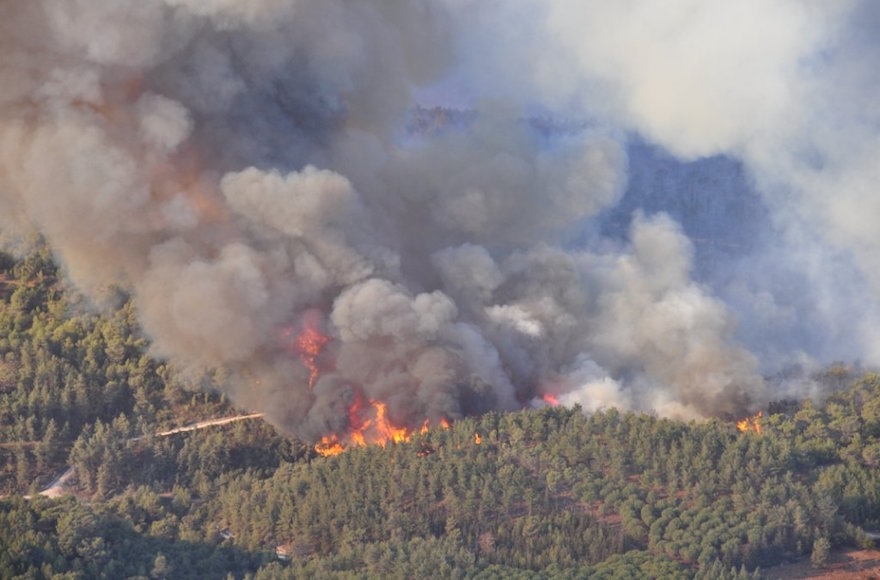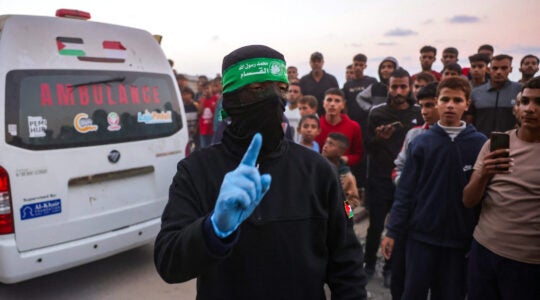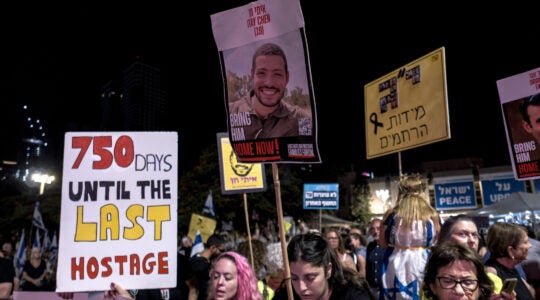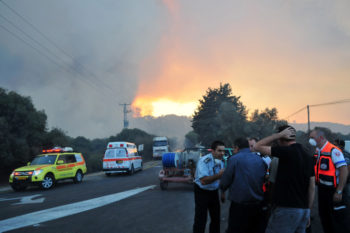
At least 40 Israelis have been killed in a forest fire in northern Israel described as out of control, Dec. 2, 2010. (Flash90)
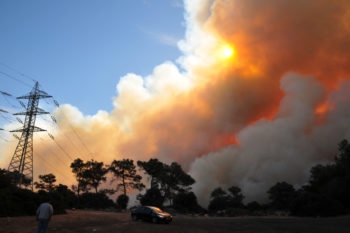
At least 40 Israelis have been killed in a forest fire in northern Israel described as out of control, Dec. 2, 2010. (Flash90)

At least 40 Israelis have been killed in a forest fire in northern Israel described as out of control, Dec. 2, 2010. (Flash90)
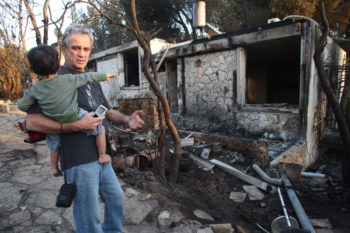
Father and son look at their house in Ein Hod, near Haifa, that was burned down in the fire that ravaged the Carmel Forest, Dec. 5, 2010. (Meir Partush/Flash 90)
JERUSALEM (JTA) — In the aftermath of the deadliest fire in Israel’s history, Israelis this week set to the task of burying the dead, cleaning up and figuring out what exactly went wrong — and who is to blame.
Even before the blaze in the Carmel Mountains near Haifa came under control Sunday afternoon, Israelis were asking why the country wasn’t better prepared for a wildfire of this magnitude. In all, 42 people were killed, about 250 homes were destroyed or severely damaged, 17,000 people were forced to evacuate, more than 12,000 acres were burned and an estimated 5 million trees were lost.
“The Carmel disaster highlights the outrageous gaps in Israel’s strategic and day-to-day readiness,” the editorialists at Haaretz wrote Sunday while echoing a call for a state commission of inquiry to examine who bears responsibility for the failures of the Israeli fire service.
“What’s better to spend the State of Israel’s money on, firefighting aircraft or an F-15 fighter jet?” wrote Eitan Haber, a former Rabin administration official and now a columnist for Ynet.
The damage to the area of the Carmel Forest in northern Israel was estimated at about $75 million, including damage to towns and kibbutzim, destroyed forests and damaged roads. Yemin Orde, an aliyah youth village founded in 1953 that has served as a home and school to thousands of immigrant youths, most recently Ethiopians and Russians, was severely burned. In the artists’ village of Ein Hod, 10 houses and an art gallery were destroyed.
On Sunday, the Israeli Cabinet approved a $16.5 million aid package to assist damaged communities, and Prime Minister Benjamin Netanyahu ordered that each person whose home suffered severe fire damage be given an immediate aid disbursement of about $700.
Calls came from many quarters for the resignation of Interior Minister Eli Yishai, whose ministry is responsible for the state’s firefighting forces. Yishai also is accused of refusing fire truck donations from the International Fellowship of Christians and Jews.
Yishai said his ministry was not funded well enough to purchase needed equipment — in 2001, he noted, Ariel Sharon’s government voted to eliminate air support for fire fighting — and told Israel Radio that he was a target because of his Sephardic heritage.
Israel has 16 firefighters per 100,000 residents; by contrast, the United States, Japan and Greece have five to seven times that number per capita, The Associated Press reported. In total, Israel has 1,400 firefighters.
A 14-year-old resident of the Druze village of Ussfiya was arrested Monday after admitting to starting the fire. The teen reportedly said he was smoking a nargila water pipe and threw a live coal into an open area before returning to school.
The arrest was announced hours after two teenage brothers from the same village arrested over the weekend on suspicion of negligence in starting the fire were released from detention by a Haifa court. The teens had been accused of lighting a bonfire near their home that sparked the blaze.
High winds and dry conditions prompted by Israel’s parched winter thus far provided fuel for the blaze, which began tearing through northern Israel on Dec. 2. Northern Israel is covered by fields and trees, some natural forests and others planted over the last several decades — many of them by pioneers during the British Mandate period. Others were planted with donations from Diaspora Jews through the Jewish National Fund.
With its green hills, the country’s north has a Mediterranean flavor distinct from its more Middle Eastern south, which is covered by desert. After the fire, the Israeli government said it would invest the resources to make the north green again.
The fire’s rapid spread revealed a strategic weakness that could be exploited by its enemies, Israeli commentators wrote.
Meanwhile, numerous figures in the Arab world cited the fire as punishment from God for Israel’s treatment of the Palestinians and its occupation of Arab lands. The Palestinian prime minister in the Gaza Strip, Ismail Haniyeh, said the fire was a “strike from Allah.”
The spiritual leader of the Israeli Orthodox Shas Party, Rabbi Ovadia Yosef, also said the fire was divine punishment, attributing the blaze to the sin of lack of observance of the Sabbath.
During the height of the blaze, Israeli’s chief Sephardic rabbi, Shlomo Amar, led thousands in prayer at the Western Wall. Chief Ashkenazi Rabbi Yona Metzger called on Israelis to give charity and read Psalms to bring about the fire’s end.
For its part, the Israeli government issued a rare call for international assistance. Among the countries that responded were Egypt, Jordan, Turkey, Cyprus, Greece, Germany, Russia, France, Switzerland, Britain, Spain and the United States. The Palestinian Authority also sent 21 firefighters and four fire trucks to help battle the blaze; Israeli media reported that the trucks were a gift to the Palestinians from the European Union.
Thirty-five firefighting airplanes came to Israel. New York sent a 747 loaded with Fire Troll 931, a fire retardant chemical, in a shipment organized by the Fire Depart.ment of New York City and the office of the city’s mayor, Michael Bloomberg.
Israel also rented the American Evergreen Boeing 747 Super Tanker, one of the most advanced firefighting planes in the world, loaded with 80,000 liters of water and fire retardant. It arrived early Sunday morning and had an immediate effect on helping douse the flames.
The deadliest incident came in the fire’s early hours when a bus carrying about three dozen cadets from the Israeli prisons service on their way to evacuate a prison threatened by the blaze became trapped between burning trees. Nearly all those aboard perished, and the bus was left a scorched shell.
Two firefighters who rushed to rescue the guards and a 16-year-old volunteer, Elad Riven, also were killed. All of the bodies were identified, some using DNA technology, by Saturday night, and funerals began being held while the blaze was still raging.
“No one sent you, no one called for you, no one but your wonderful and brave conscience,” Israeli President Shimon Peres said during a eulogy at the funeral for Riven on Sunday. The “disaster taught us that all of us — Jews, Arabs, Druze and other peoples — share the same fate.”
A day after the blaze was brought under control, the fire’s death toll rose by one with the death of Haifa Police Chief Ahuva Tomer, who was burned over most of her body while trying to assist the prison guard cadets.
Jewish communities in Denver and Winnipeg, Canada, also mourned the death of one of the bus passengers, Rabbi Uriel Malka, 32, who was working as a chaplain in the Israeli Prisons Service.
Malka, a father of five, worked as a Jewish Agency emissary for two years in Denver and then served as principal of the Ohr Hatorah Day School in Winnipeg. Malka had narrowly escaped death during combat in the Second Lebanon War.
JTA has documented Jewish history in real-time for over a century. Keep our journalism strong by joining us in supporting independent, award-winning reporting.
